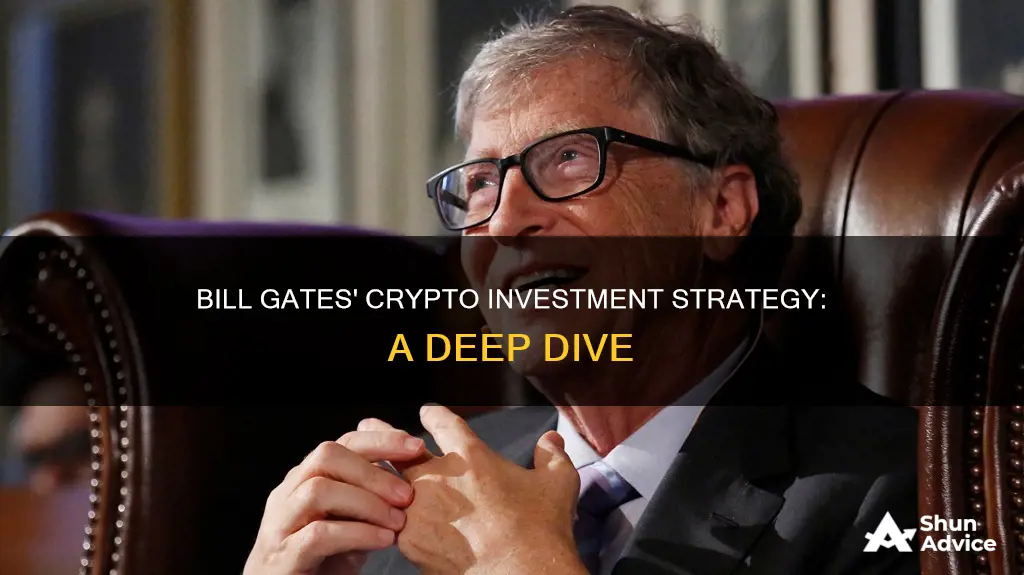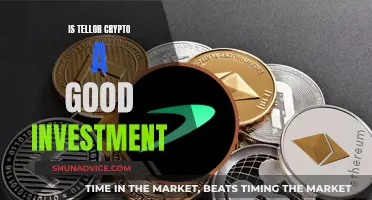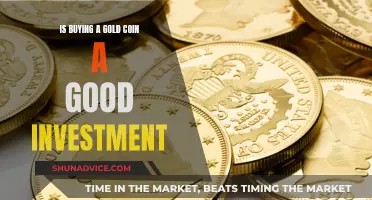
Bill Gates, the billionaire Microsoft co-founder, has expressed his views on cryptocurrencies and NFTs, stating that they are 100% based on greater fool theory. This theory refers to the idea that investors can profit from overvalued or worthless assets if there are enough people willing to drive up their prices. Gates has said he is not involved in crypto and that he prefers traditional investments with valuable output. However, he has also acknowledged the potential benefits of digital currencies and the role they can play in making transactions more efficient, especially in developing countries. While Gates remains skeptical about cryptocurrencies, he has not outright dismissed them, and his comments provide insight into his investment philosophy and outlook on emerging technologies.
| Characteristics | Values |
|---|---|
| Bill Gates' view on investing in cryptocurrency | Gates is skeptical about investing in cryptocurrency, preferring investments with "valuable output". |
| Bill Gates' view on NFTs | Gates believes that NFTs are "100% based on greater fool theory". He has mocked Bored Ape NFTs, calling them "expensive digital images of monkeys". |
| Bill Gates' view on Bitcoin | Gates has described himself as neutral on Bitcoin, but has also warned potential investors about its volatile nature. |
| Bill Gates' view on digital currencies | Gates has predicted that digital currencies will eventually emerge as the main form of payment method. |
What You'll Learn

Bill Gates is not a fan of cryptocurrencies
In a recent 'Ask Me Anything' exchange on Reddit, Gates revealed that he has not distributed any of his wealth into cryptocurrencies. He explained that he prefers investing in things with "valuable output", and that the value of companies is based on the products they create. In contrast, he believes that the value of cryptocurrencies is based solely on what someone else will pay for them, and therefore does not add value to society in the same way that other investments do.
Gates has also criticised the decentralised and anonymous nature of cryptocurrencies, arguing that they pose risks to financial stability and could enable illicit activities. Additionally, he has mocked NFTs, or non-fungible tokens, referring to them as "expensive digital images of monkeys" that will not improve the world.
While Gates acknowledges the potential benefits of digital currencies, particularly in terms of transparency and regulation, he remains unconvinced about the value and legitimacy of cryptocurrencies. He has described them as being based on "greater fool theory", suggesting that their value is based solely on speculation and the willingness of investors to pay higher prices.
Overall, despite his reputation as an ambassador of technological advancement, Gates remains highly sceptical about cryptocurrencies and does not appear to be interested in investing in them himself.
Best App for Bitcoin Investment: Your Guide
You may want to see also

Gates is concerned about the volatility of Bitcoin
Bill Gates, the Microsoft co-founder, has expressed his concerns about investing in cryptocurrencies, particularly highlighting the volatile nature of Bitcoin. In a recent discussion, Gates emphasised the risks associated with Bitcoin's volatility, which could lead to significant financial losses for investors.
Gates' comments on Bitcoin volatility are not without merit. He has pointed out that the value of Bitcoin can be significantly influenced by social media activity, specifically mentioning Elon Musk's posts as an example of factors that can sway cryptocurrency prices. Gates' concern is that those with fewer financial resources than Musk could be vulnerable to substantial losses if the value of their Bitcoin investments drops unexpectedly.
The TechCrunch conference in June 2022 highlighted Gates' scepticism about cryptocurrencies. He stated that he was "not long or short" on crypto and preferred traditional investments with tangible outputs, such as farms or companies producing goods. Gates' neutral stance on Bitcoin is influenced by his concern about its volatility and the potential for financial losses, especially for those with limited financial means.
Gates has also criticised the decentralised nature of cryptocurrencies, including Bitcoin, which enables anonymous and irreversible transactions. He believes this lack of transparency poses risks to financial stability and could facilitate illicit activities. While Gates acknowledges the potential benefits of digital currencies, particularly in developing countries, he remains cautious about investing in Bitcoin due to its volatile nature and potential regulatory challenges.
In conclusion, Bill Gates' concerns about the volatility of Bitcoin are well-founded, and he has consistently expressed his scepticism about investing in cryptocurrencies. His preference for traditional investments with tangible outputs reflects his cautious approach to financial risk and his consideration of the broader implications of cryptocurrency adoption.
Elon Musk's Bitcoin: A Guide to Investing
You may want to see also

He has warned potential investors about the risks of BTC
Bill Gates has warned potential investors about the risks of BTC. He has expressed concern over the volatile nature of Bitcoin and other cryptocurrencies, stating that their value could be significantly influenced by social media activity. Gates has distinguished himself from other tech and celebrity figures who have embraced cryptocurrencies, such as Elon Musk and Tesla. While Tesla invested heavily in Bitcoin, causing its price to rise, Gates has cautioned that average investors should not follow this lead. He believes that cryptocurrencies are highly speculative and that people with less financial means could suffer severe financial losses.
Gates also highlighted the decentralized nature of cryptocurrencies and their potential to facilitate anonymous and irreversible transactions. These features, according to Gates, pose risks to financial stability and could enable illicit activities. He has referred to the idea of profiting from worthless or overvalued assets as the "greater fool theory." This theory suggests that investors can make money on these types of assets as long as there are people willing to pay more for them.
Gates' comments on the risks of BTC and other cryptocurrencies are informed by his broader investment philosophy. He has stated that he prefers investing in things with valuable output, such as companies that make great products. This approach reflects his preference for more traditional and stable investments, such as farms or companies with physical products, rather than speculative digital assets.
While Gates has taken a cautious stance on BTC, he has acknowledged the potential benefits of digital currencies, especially when transparency and regulation are involved. He has also recognised the potential of blockchain technology as one of the most important technological achievements of the 21st century. However, his primary concerns about BTC and other cryptocurrencies centre around volatility, the potential for misuse, and the lack of regulation in the space.
Litecoin vs. Bitcoin: Which Crypto is the Better Investment?
You may want to see also

Gates prefers traditional investments with valuable output
Bill Gates, the billionaire Microsoft co-founder, has expressed his scepticism about cryptocurrencies and non-fungible tokens (NFTs). In a TechCrunch talk on climate change, Gates described the phenomenon as "100% based on greater fool theory," referring to the idea that investors can profit from worthless or overvalued assets as long as there are enough people willing to pay more for them.
Gates' comments reflect his preference for traditional investments with valuable output. He said, "I like investing in things that have valuable output. The value of companies is based on how they make great products." Gates values tangible investments, such as farms that produce output or companies that create tangible products. This perspective aligns with his belief that the value of crypto is based solely on speculation and what someone else is willing to pay for it, rather than any intrinsic value it adds to society.
In contrast to his stance on crypto, Gates has a diverse investment portfolio that includes technology giants, traditional sectors with solid growth prospects, and foundational industries. For example, he has invested in Nvidia Corp., Waste Management Inc., and Caterpillar Inc. This approach showcases his interest in both innovative technologies and well-established companies with strong fundamentals and growth potential.
Gates' scepticism about cryptocurrencies also stems from concerns about their volatility and potential for misuse. He has warned potential investors about the risks associated with Bitcoin's volatility, especially for those who may not have substantial financial resources. Additionally, he has highlighted the decentralised and anonymous nature of cryptocurrencies, which could enable illicit activities and pose risks to financial stability.
While Gates acknowledges the potential benefits of digital currencies, especially with transparency and regulation, his preference for traditional investments with valuable output remains evident. His investment philosophy emphasises a balanced approach, combining high-growth potential sectors with stable, essential services, reflecting his interest in both cutting-edge innovation and established companies with proven track records.
Canada eCoin: A Smart Investment Move?
You may want to see also

He is critical of NFTs, calling them a sham
Bill Gates has been vocal about his scepticism of cryptocurrencies and non-fungible tokens (NFTs). At a TechCrunch talk on climate change in June 2022, the billionaire Microsoft co-founder described crypto and NFTs as "100% based on greater fool theory". This theory refers to the idea that investors can profit from worthless or overvalued assets as long as there are people willing to pay more for them.
Gates specifically targeted NFTs, joking about the popular Bored Ape Yacht Club NFT collection:
> Expensive digital images of monkeys will improve the world immensely.
He further elaborated on his preference for traditional investments:
> I'm used to asset classes ... like a farm where they have output, or like a company where they make products.
Bill Gates' criticism of NFTs highlights his belief that they lack intrinsic value and are purely speculative investments driven by hype and the expectation of finding a "greater fool" to buy them at a higher price. This perspective aligns with his broader scepticism of cryptocurrencies, which he has warned others against investing in, especially those with less money than Elon Musk.
Bitcoin Capital Corp: A Wise Investment Decision?
You may want to see also
Frequently asked questions
No, Bill Gates does not invest in cryptocurrency. He has publicly stated that he is "not long or short any of those things". Gates has also expressed concern about the volatile nature of cryptocurrencies and their potential to facilitate illegal activities.
Bill Gates is sceptical about cryptocurrency. He has said that he prefers to invest in things with "valuable output" and that the value of cryptocurrency is based on what someone else will pay for it. He also believes that cryptocurrencies are 100% based on greater fool theory, referring to the idea that investors can profit from overvalued assets as long as there are people willing to pay more for them.
No, in an interview in 2014, Gates praised Bitcoin as "better than currency". He also acknowledged the potential benefits of digital currencies, particularly in terms of transparency and regulation. However, he has never disclosed whether he owns any cryptocurrency and his views seem to have become more negative over time.







